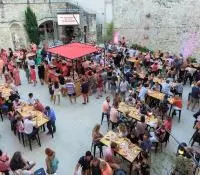Appellations from the Rhône Valley
Côtes du Rhône and Côtes du Rhône Villages
The Côtes du Rhône appellation was awarded AOC status – a classification denoting quality and authenticity – in 1937, just two years after the AOC system was set up. The sheer speed with which accreditation was granted shows how good the wines must be! The Côtes du Rhône Villages appellation, one step up from the regional appellation, appeared in 1967, followed by the Côtes du Rhône Crus. The latest of these is Cairanne, with Cru status since 2016.
This 3-tier hierarchy makes up the Côtes du Rhône ‘quality pyramid’, with the regional appellation at its base, Côtes du Rhône Villages (with and without village name) on the rung above, and the Crus at the apex. Strict production criteria make sure standards are met, and ensures that each wine reflects the intrinsic qualities of its terroir. The Côtes du Rhône vineyards are in constant pursuit of excellence.
Serving the appellations
Terroir is what gives wine a ‘sense of place’. It’s not an easy concept, but can be loosely defined as the way environment and people affect the flavour and character of the wine. It includes anything that differentiates one vineyard area from another.

To better understand
Côtes du Rhône AOCs
Find out more about the Côtes du Rhône appellations through their hierarchy.
Côtes du Rhône AOCs
- Côtes du Rhône Crus AOC
- Côtes du Rhône Villages with geographical name
- Côtes du Rhône Villages AOC
- Côtes du Rhône AOC
100%

The Rhône Valley
The Rhône Valley is the second largest AOC (Appellation d'Origine Contrôlée) vineyard in France. It has no fewer than 31 appellations divided into different categories, reflecting its richness and diversity. Its history, which spans two centuries, is marked by a deep winemaking tradition, shaped by the terroir, the climate and the expertise of the winegrowers. Through its renowned wines, the Rhône Valley remains a pillar of French oenology, symbolizing the excellence and authenticity of the country's winemaking traditions.

Côtes du Rhône Crus AOC
The Côtes du Rhône Crus are divided into 17 crus (including 2 natural sweet wines), divided between the two geographical regions that make up the Rhône Valley: the north (septentrional) and the south (méridional). Each of these crus has its own particularities in terms of terroir, grape varieties and wine style.
The 8 crus septentrionaux in the northern Rhône Valley are Château-Grillet, Condrieu, Cornas, Côte-Rôtie, Crozes-Hermitage, Hermitage, Saint-Joseph and Saint-Péray. In the southern Rhône Valley, we find the 9 crus méridionaux: Beaumes de Venise and Muscat de Beaumes de Venise, Cairanne, Châteauneuf-du-Pape, Gigondas, Lirac, Rasteau and the natural sweet wines of Rasteau, Tavel, Vacqueyras and Vinsobres.

Côtes du Rhône Villages with geographical name
In the hierarchy of Côtes du Rhône Villages, 22 have a geographical name. These 22 Côtes du Rhône Villages share a common DNA and climate, while benefiting from the great diversity of terroirs that give the wines of each village their distinctive character.

Côtes du Rhône Villages AOC
The Côtes du Rhône Villages appellation area is spread over 95 communes in four departments in the south of the vineyard: Ardèche, Drôme, Gard and Vaucluse.

Côtes du Rhône AOC
The Côtes du Rhône appellation area is spread over 172 communes in six departments in the south of the vineyard: Ardèche, Drôme, Gard, Loire, Rhône and Vaucluse.
Côtes du Rhône AOC's (except crus)
Key figures
Appellations
2
Soil

Sands

Limestone

Clay

Rocky
Climate
Mediterranean
Influenced by Mistral wind
Aromas
Épices
Notes fruitées
Notes florales
Palate
Elegant
Generous
Balance
Freshness
Main grape varieties
Grenache
Mourvèdre
Syrah
Bourboulenc
Clairette
Marsanne
Roussanne
Production
Learn more
Reds

Rosés

White
These events might interest you
AOC Côtes du Rhône wines, on track at the 28th Alpe d'Huez International Comedy Film Festival

Avignon, capital of the Côtes du Rhône, will celebrate its wines and winemakers on May 2025 - Stay tuned !

Côtes du Rhône Wine bar

Discover Côtes du Rhône wines at the Lyon Street Food Festival
